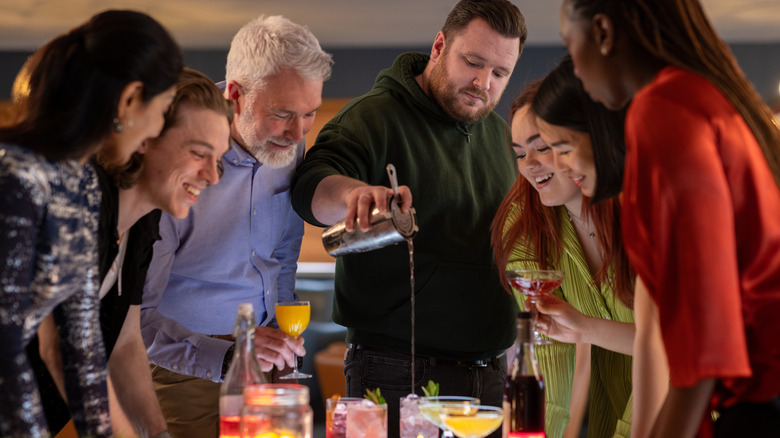What Happens At A Cocktail Masterclass?
Do you know the difference between a jigger and a juicer? A muddler from a rimmer? A Hawthorne strainer versus a Julep strainer? Do you know the best tequilas for making a margarita? Or how to make any of the 25 most popular cocktails of all time? If you answered "no" to any or all of these questions, it may be time to take a cocktail-making class.
Molly Horn, chief mixologist and spirits educator at Total Wine & More, the country's largest independent retailer of fine wine, told us that a cocktail-making class can teach you the tips and tricks for making a few select cocktails. It can also cover the history around those cocktails, recommended spirits to use, and other useful expert advice. You may even learn there are three different types of cocktail shakers.
"The right masterclass can be an amazing experience, especially if you feel like bartenders often make your favorite drink better than you can at home, or if you like to entertain friends or family and enjoy having a story to tell around what you're making," Horn told Chowhound in an exclusive exchange. If you're new to cocktail-making, Horn suggested taking an in-person class rather than a virtual one since you'll have the opportunity to make the drinks with an instructor who can help you master the basics of technique. Total Wine, which operates 282 superstores across 29 states, regularly offers classes that range from the more broad-ranging Mixology 101 to those focusing on specific spirits and brands.
Lesson one: Knowing the differences between bartending and mixology
Before signing up for anything, keep in mind that different class providers use different nomenclature to indicate what their classes offer. Even though there is a difference between being a mixologist and a bartender — with the former focused on recipe creation and crafting — some educators use the terms interchangeably. Total Wine, Molly Horn says, considers bartending classes to be more trade-focused. "They're primarily focused on technique, and the assumption is that you will be at a bar with every possible tool/resource," she explained in her exclusive talk with Chowhound. Cocktail classes, on the other hand, "are focused on the home mixologist, which means the technique, tips, and advice they focus on are more realistic and executable for anyone who isn't actually making drinks at a professional establishment." She also noted that cocktail classes are more about entertaining, whereas bartending classes are focused on execution, speed, and customer service.
Will you walk away from a cocktail class ready to make any drink your guests ask for? Probably not. "Your biggest takeaway might be something small, like why you would use a flamed orange as a garnish versus a regular orange twist (and of course the fun science behind that)," Horn said. For a flamed twist, the peel is squeezed over a lit match or lighter, caramelizing the oil as it is released. "It really depends on what drinks the class is built around and what the instructor is passionate about and wants to share," she added.

